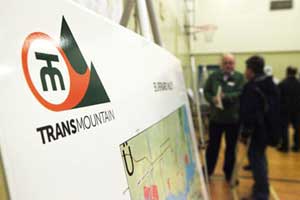
Among the 468 people rejected outright from participating in the National Energy Board's Kinder Morgan pipeline hearings next year, one professional planner is calling the process "Kafkaesque" -- and now questions its legitimacy altogether.
Eric Doherty, a registered professional planner whose resumé includes energy research for BC Hydro, was among the list of applicants "denied participation" by the NEB. While others have expressed dismay that an additional one-in-five applicants were downgraded to a single letter expressing their views, that was all Doherty had requested.
"All I was applying for was the right to make a written submission," he told The Tyee, "and they rejected me.
"I was actually applying as somebody who has expertise. It's a Kafkaesque idea that someone with my qualifications would spend five hours applying to just send them a letter.... It's really taken any legitimacy away from this process, to have such a high bar."
The Vancouver-based consultant and Langara College planning instructor said he'd hoped to submit his research on potential economic costs of the controversial pipeline expansion, which would ramp up the flow of diluted bitumen from Alberta's oil sands to a Burnaby tanker terminal. He told The Tyee his letter would have warned of a "loss to the economy" should the project be "orphaned" by falling demand for fossil fuels.
"That's happened with projects before in B.C.," he argued, citing the Tumbler Ridge coal mine. "Somebody's invested in them but they just sit there not being used.
"It's about climate change, but it's about the economic effect the climate is going to have on the fossil fuel industry -- and the dead end Canada is heading into."
Holes in list of concerns allowed
An NEB spokeswoman told The Tyee that the board's primary criteria -- as explained to would-be applicants -- were that they "could be directly affected by this project," and that their concerns "matched up with" a list of 12 issues to which comment has been limited by the board.
"It may be they didn't provide enough information to convince board members they were directly affected," Sarah Kiley told The Tyee. "Some may have done a better job -- that might have been why they were accepted.
"I heard one board member say, 'Convince me you were directly affected and have information and knowledge to share'... it was up to applicants to provide a full explanation of why they had an interest."
Doherty lashed out at the suggestion that rejected applicants had simply failed to convince the board they were "directly impacted," arguing that -- although he doesn't live near the pipeline route or shoreline -- he enjoys kayaking, eating local oysters and visiting Stanley Park, all of which would be directly impacted by a tanker spill.
"That's absolutely ridiculous," he said, "and it's an absolutely ridiculous expectation to set.
"The impacts on me are indirect, but those are some of the most important impacts."
According to the NEB's hearing guidelines, intervenors and commenters can address 12 broad themes, including economic feasibility, environmental and socio-economic effects, marine shipping safety, pipeline route and design, Aboriginal interests, spill planning and safety.
But the same guidelines document stated that NEB will not "consider the environmental and socio-economic effects associated with upstream activities, the development of oil sands, or the downstream use of the oil transported by the pipeline."
The president of the B.C. Chamber of Commerce told The Tyee last week he supported the new streamlined approach to the pipeline review process, which would cut out "repetitive" submissions that -- during the Enbridge Northern Gateway hearings -- "wasted a lot of people's time in terms of the repetitive nature of testimony that, at the end of the day, had no real bearing on the decision."
But the Sierra Club B.C.'s campaign director called the rejection of nearly half of applicants' requests "profoundly undemocratic" and "ill-advised," and prevented key expertise and knowledge from being shared with regulators.
"This is a rigged process, deliberately designed to silence the legitimate voices of British Columbians on an issue that has profound implications for our province," Caitlyn Vernon said in a statement. "All British Columbians are directly affected by the Kinder Morgan proposal, which threatens B.C. families, jobs, salmon and climate."
The NEB's Kiley, however, explained the restrictions are a "relatively new change to our legislation -- to the way we do business," but that the agency feels "quite confident we can have an efficient and fair hearing." ![]()
Read more: Energy, Environment














Tyee Commenting Guidelines
Comments that violate guidelines risk being deleted, and violations may result in a temporary or permanent user ban. Maintain the spirit of good conversation to stay in the discussion.
*Please note The Tyee is not a forum for spreading misinformation about COVID-19, denying its existence or minimizing its risk to public health.
Do:
Do not: